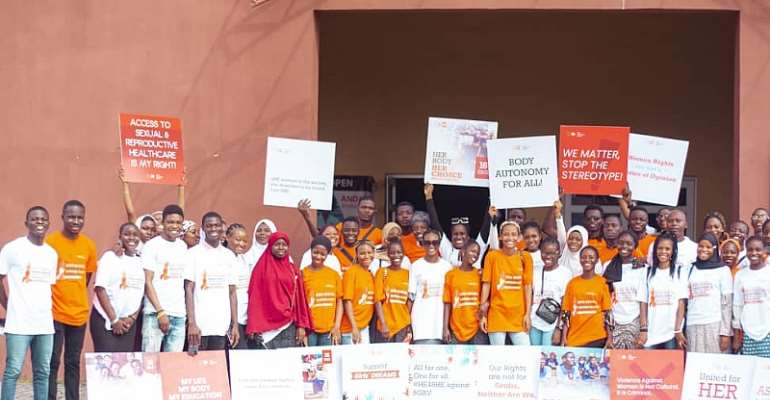UN-Youth Participatory Platform Calls For Strict Actions Against Sexual Harassment And Gender-Based Violence In Tertiary Institutions

The United Nations Populations Fund (UNFPA)- Youth Participatory Platform has called for strict disciplinary actions and policies against sexual harassment and gender-based violence in Nigerian tertiary institutions.
This call was made in a statement released by Youth Coordinator of the United Nations Populations Fund (UNFPA) Youth Participatory Platform (YPP), George Adjete, obtained by The Nigerian Voice correspondent on Monday.
The statement which lamented the high level of sexual harassment reportedly rampant in tertiary schools, also decried how victims were usually kept silent due to “myriad sensitivities some of which include lack of knowledge as to what constitutes sexual harassment as codified by existing laws/policies, believing that the behavior was not serious, thinking it is easier to keep quiet or quit rather than face the discomfort of confrontation, and inability to prove the claim with evidence. ’’
Mr George said the UNFPA- YPP organised a sensitisation march staged on Friday, 2nd of December at Lagos State University's main campus, Ojo, to create awareness on gender- based assaults.
The statement reads: “According to the latest estimates, nearly 1 in 3 women aged 15 years and older, around the world have been subjected to physical or sexual violence by an intimate partner, non-partner, or both, at least once in their lifetime, indicating that levels of violence against women and girls have remained largely unchanged over the last decade. These numbers do not reflect the impact of the COVID-19 pandemic and would be even higher if they included the full continuum of violence that affect women and girls including sexual harassment, violence in digital contexts, harmful practices, and sexual exploitation.
“Eliminating all forms of violence at work and in education is not only the right thing to do from a human and labor rights perspective, but it also is the smart thing to do to protect students and staff of educational institutions.
“Equally important is the fact that sexual harassment is one of the leading causes of high turnover and absenteeism at school and work. Sexual harassment can be more prevalent in fields of study where there is an unequal sex ratio and large power differentials between women and men.
“In Nigeria, 70 percent of female graduates from a sample of tertiary institutions reported having been sexually harassed, with the main perpetrators being classmates and lecturers. The effects experienced by victims were depression and perceived insecurity on campus. A survey administered to a random sampling of students across 3 tertiary institutions in Lagos State shows that respondents had experienced physical, 90.4 percent had experienced verbal, and 80 percent had experienced nonverbal forms of sexual harassment, respectively. The 2018 World Bank Group’s Women, Business, and the Law data show that in 59 countries, there are no laws on sexual harassment in the workplace. In 123 countries, there are no laws on sexual harassment in education. In Africa, 36 of the 47 countries with data do not have laws penalizing sexual harassment in this area.
“Sexual harassment in tertiary institutions is often ignored and unreported, due to myriad sensitivities some of which include lack of knowledge as to what constitutes sexual harassment as codified by existing laws/policies, believing that the behavior was not serious, thinking it is easier to keep quiet or quit rather than face the discomfort of confrontation, and an inability to prove the claim with evidence. It is critical to recognize that sexual assault and sexual harassment are different from other types of student misconduct, such as plagiarism as such, and tertiary educational institutions should adopt policies to address them. In a statement, the youth coordinator of the United Nations Populations Fund (UNFPA) Youth Participatory Platform (YPP) George Adjete who led the march said the current complex situation in Nigerian tertiary institutions has led to heightened fear from victims of Gender Based Violence to report cases while sometimes they do not know they can even report and get help/justice. When it comes to reportage of perpetrators, female students/staffs including those with disabilities are at disproportionate risk and face greater barriers in accessing services and justice.
“The COVID-19 pandemic demonstrated that the world was unprepared to respond to the rapid escalation of all forms of Sexual and Gender-Based Violence.
“If we want to ensure that no woman or girl is left behind, we need comprehensive and inclusive approaches that can be adapted to rapidly changing contexts, preventing and responding to all forms of Sexual and Gender-Based Violence hence today the UNFPA-YPP organized a March/walk to sensitize the students and staffs of the Lagos State University community about sexual and gender-based violence response and preventions is a means to an end, we believe we have set in motion a chain of reaction given that tertiary institutions have within it a diverse population from all spheres of the General society. We recommend that Anti-Sexual harassment/Sexual and Gender-Based Violence policies should be adopted in tertiary institutions and popularized the same way the anti-plagiarism or anti-exam malpractice policies are popularized to enable students to know their right to protection from all forms of violence on campus as well as know which tool to employ when the need arises. ’’
